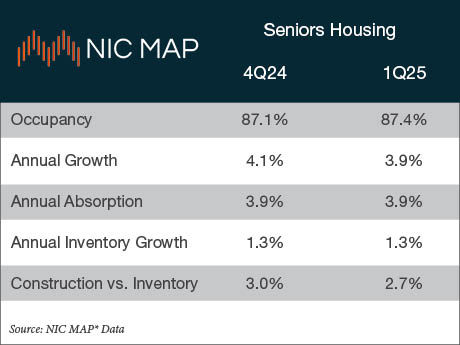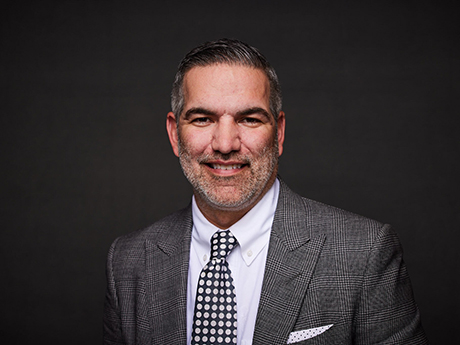Jason Dopoulos and Ken Gould, co-founders of Cleveland-based Ikaria Capital Group, have ambitious plans for their fledgling company, which specializes in financing skilled nursing and seniors housing facilities.
The duo is intent on their firm becoming the No. 1 lender in HUD’s Section 232 program, which provides mortgage insurance for residential care facilities such as assisted living facilities and nursing homes.
“We want to be the No. 1 HUD lender within three years. We want to do $1 billion to $1.5 billion of bridge loans a year, and we want to grow our asset-based lending (ABL) platform to $1 billion in three to five years,” says Dopoulos, managing principal.
“We also will be starting our own internal fund to participate along the capital stack to offer customized solutions to our clients. We have some very strong competitors out there, but we believe our culture and people are the best in the business, which will enable us to hit our lofty goals,” he adds.
Dopoulos and Gould, veteran seniors housing lenders, were formerly with Lancaster Pollard (acquired by Orix USA in 2017) and White Oak Healthcare Partners, a subset of White Oak Healthcare Finance. Ikaria offers bridge financing, permanent lending, ABL and capital advisory services.
The team Ikaria has assembled boasts more than 100 years of combined experience in the seniors housing and care sector. Collectively, the team has closed more than $12 billion in deals over the course of their careers.
In March, Ikaria announced an expanded partnership with San Clemente, California-based CareTrust REIT (NYSE: CTRE), which will continue to deploy capital in the seniors housing and nursing home sectors. CareTrust closed approximately $1.5 billion of investments in 2024. Several of those deals stemmed from its relationship with Ikaria’s principals.
Seniors Housing Business conducted a Q&A with Dopoulos to learn more about the timing of the company’s launch, the void it’s filling in the marketplace, the growth of the bridge-to-HUD financing model, and the state of the seniors housing and care industry.
Seniors Housing Business: What led you and Ken Gould to launch Ikaria Capital Group in 2024? Was it simply the entrepreneurial spirit within each of you, or were there other factors such as a void in the marketplace that you two believed you could fill?
Jason Dopoulos: It was more the former. We had a good run with White Oak Healthcare Finance the last few years, even through the COVID-19 pandemic, but our roots date back to when we worked at Lancaster Pollard. We helped grow that company with our founders through its life cycle and ultimate sale. We caught the entrepreneurial bug while building our career path there.
In our business, it takes time for capital partners and investors to trust you and your team. White Oak was a great step in our growth by working for a large asset manager, and we felt ready to launch our own firm in late 2024.
We do feel there are still voids in the capital market for our clients that we will try to fill as we roll out products and platforms. We will continue to work in the bridge-to-HUD lending space. We have our HUD license and a pipeline in excess of $1.5 billion that we are processing already. With that said, we will be rolling out some new products shortly, including an ABL platform for our operators.
We want to be able to offer customized solutions and high-end customer service to our clients while maintaining the feel of a smaller shop where clients are not passed around departments. The accountability really starts with me, Ken and our bankers.
SHB: The name Ikaria is derived from a Greek island of the same name in the blue zone, a region where people are known to live exceptionally long lives, often beyond age 80, due to a combination of lifestyle factors like physical activity, low stress and strong social connections. You also are of Greek heritage. Does the company name have a particular philosophical tie-in with the longevity aspect? Do you field many questions regarding the company name?
Dopoulos: We do field a lot of questions regarding the company name — the first one being how do you pronounce it? My grandparents emigrated from Greece. Based on my visits there and seeing the vibrancy of the seniors, I felt the name ties in perfectly to our industry.
We are always trying to find ways to age gracefully and live longer, and the simplest things — in my mind — over in Greece have proven to do that. The name definitely ties into that philosophy.
SHB: How did that experience at Lancaster Pollard and White Oak Healthcare Partners help prepare you for the start of your own company?
Dopoulos: Both experiences prepared us for where we are now. While we were at Lancaster Pollard, we helped start the HUD LEAN program at the firm and saw the immense growth and importance of that program within our sector. (The HUD LEAN program is a streamlined method of processing HUD Section 232 loan applications patterned after Toyota’s operational processes.)
At that time, bridge lending and HUD lending were not that integrated within the market, and we helped grow Lancaster Pollard into the leading HUD LEAN lender for several years running.
Once Lancaster Pollard was sold, the market was changing to the point where you needed bridge capital to secure the future HUD business. So, we decided to join White Oak to get more experience with that side of the business. For more than four years, we worked and figured out an efficient manner to source and close bridge-to-HUD transactions.
Consequently, we were comfortable starting our own venture, knowing we had the team to execute on the whole process. That is what we did in late 2024.
SHB: How many employees does the firm currently have?
Dopoulos: We have 19, soon to be 20. Our headquarters is in Cleveland, and we have an office in Newport Beach, California. We will soon be adding an office in Columbus, Ohio, and then we’ll see where it goes from there. We have people all over the country, but our team has been together for many years. So, we are fine with some of our team working remotely.
SHB: CareTrust REIT owns, acquires and leases skilled nursing, seniors housing and other healthcare-related properties. The stock closed at $26.65 per share on April 8, up 42 percent from five years ago. Can you explain for our readers how Ikaria works with CareTrust?
Dopoulos: They have been a close friend for years, dating back to our days at White Oak. I personally have known their leadership back even further when I covered the West Coast for Lancaster Pollard. Many REITs these days participate in the debt markets in one manner or another, and we have been fortunate enough to have CareTrust participate in several of our deals that we have originated. These debt deals give the REIT good current yield, introductions to new operators and a relatively predictable payoff structure with the bridge-to-HUD cycle.
On the deals we bring CareTrust, we typically partner with a bank to provide unitranche financing to our clients. (Unitranche debt combines senior and subordinated debt within a mortgage loan structure. It is not mezzanine debt.) Our continuing relationship will supplement our existing capital and help both of us with our growth goals.
SHB: You stated in the March 6 news release announcing the formal arrangement between Ikaria and CareTrust REIT the following: “We are poised for explosive growth in our bridge-to-HUD debt platform in 2025 and look forward to partnering with CareTrust on those deals that fit our strategic style.” Can you expound on why you are expecting explosive growth in Ikaria’s bridge-to-HUD debt platform this year?
Dopoulos: M&A activity in our sector set records in 2024 in terms of deal volume, and we expect that to continue. Interest rates have seemed to stabilize a bit, and most economists expect some additional rate cuts in 2025 that will help with underwriting debt deals. Even with some of the chatter about possible Medicaid cuts, we have not seen any slowdown in deal flow through the first quarter, and we seem to be bidding on good deals weekly. The market has become more competitive, with banks coming back in a major way. But we believe there is enough business to go around to hit our goals.

SHB: Steve Kennedy and Kass Matt, two other lenders formerly with Lancaster Pollard, launched VIUM Capital in 2020. Is your platform similar to that of VIUM Capital?
Dopoulos: It’s similar and a bit different. Those two guys are good friends of ours, and it has been great to see their success. We are not connected to a bank, so it makes our model a bit different, but we are friendly competitors and sometimes bid on similar deals.
We have some products (ABL) that they don’t, but we compete in the bridge-to-HUD marketplace. We both have correspondent relationships with Fannie Mae and Freddie Mac, so we approach that market in a similar fashion.
It is funny. Nick Gesue, our old CEO at Lancaster Pollard, is now the CEO of NewPoint Real Estate Capital, so it is great to see our old alumni spread out and be successful.
SHB: For the owners and operators who read Seniors Housings Business, what’s the main point you want to etch on their minds about your company and its services?
Dopoulos: Honestly, we are happy to be open and in the market. We believe that our high-touch philosophy of customer service is what will make us successful. If you talk to any of our clients, they will all have a similar answer as to why they are loyal and will continue to do business with us — our people.
SHB: What’s your current assessment of the health of the seniors housing sector overall? Against that backdrop, what are the greatest opportunities and challenges for Ikaria Capital Group?
Dopoulos: The senior living and skilled nursing sector is in a much better place than it was 12 to 24 months ago. On the seniors housing side, occupancy is almost back to pre-pandemic levels, and we are seeing more and more assets stabilize. Construction has been slow the last few years, so it has given operators time to fix their house. I see that changing in the coming years, as our supply needs to grow to keep up with the increasing demand.
On the skilled nursing side of the business, many states post-COVID increased their Medicaid reimbursement rates significantly, which has helped the performance of nursing homes. Meanwhile, the staffing mandate appears dead. (The U.S. District Court for the Northern District of Texas on April 7 vacated the Centers for Medicare & Medicaid Services’ minimum staffing mandate for nursing homes, according to the American Hospital Association. The rule required all nursing homes to have a registered nurse onsite and available to provide direct resident care 24/7.)
But the big topic right now is whether we will we see any Medicaid cuts. (Congress is currently discussing how to change Medicaid policies related to eligibility and coverage in order to cut $600 billion to $800 billion from the Medicaid program over the next 10 years, according to John Hopkins Blomberg School of Public Health.) My opinion is that we will not see anything substantial in the way of cuts, maybe some minor tweaks. In the wake of the COVID-19 pandemic, I am bullish on the skilled nursing sector because we saw the resiliency and the need for these assets.
Our greatest opportunity is to listen to what our clients need and provide those products. The basic bridge-to-HUD product is going to be a necessity, but that will only be one part of our story. We are excited for what 2025 and beyond will bring, and we’ll continue to add products and services to help our clients achieve their goals.
— Interview by Matt Valley

